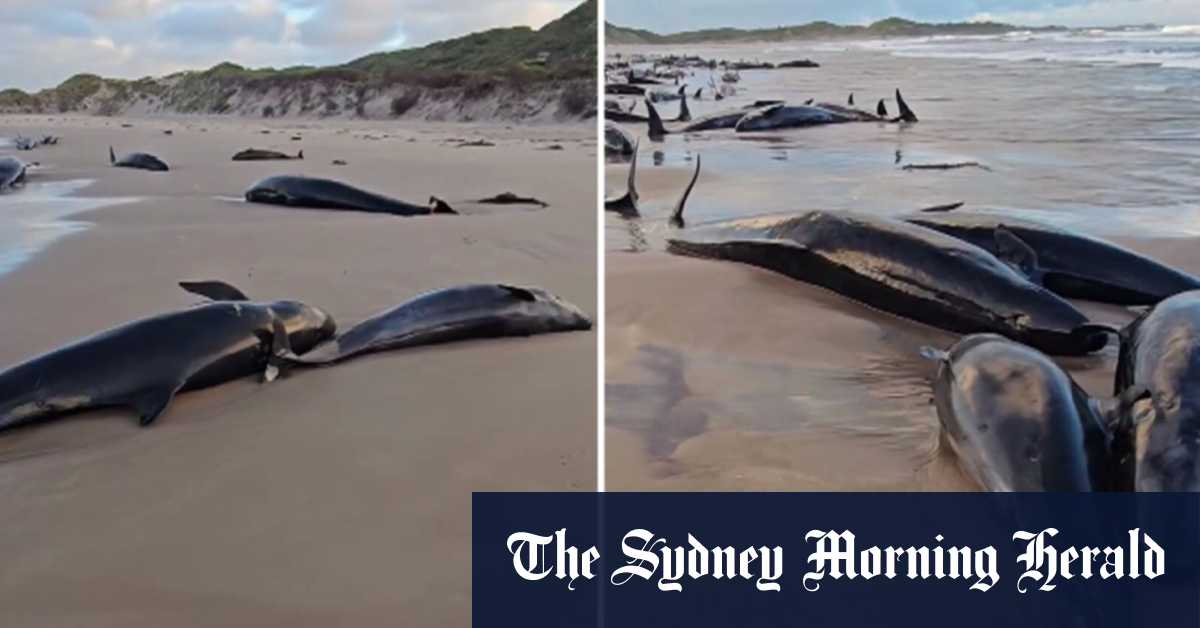Australia
More than 150 whales stranded

A Devastating Marine Emergency: Over 150 Whales Stranded in Tasmania
In a heartbreaking and unprecedented marine wildlife crisis, more than 150 false killer whales have become stranded on a beach in Tasmania. This tragic event has sparked urgent rescue efforts, as conservationists and local authorities race against time to save as many of these magnificent creatures as possible. The incident, which occurred on February 19, 2025, has drawn global attention, highlighting the fragility of marine life and the importance of swift action in such emergencies.
The False Killer Whale: A Rare and Intelligent Species
The false killer whale, a member of the dolphin family, is a highly intelligent and social marine mammal. Known for its striking appearance and close-knit pods, this species is rarely seen in shallow waters, as it typically inhabits deeper ocean regions. The fact that such a large group of these whales has ended up stranded on a beach is both puzzling and alarming. Scientists are working to determine the cause of this mass stranding, which could be attributed to a combination of factors, including navigational errors, changes in ocean conditions, or possible injuries.
Rescue Efforts Underway: A Race Against Time
As news of the stranding broke, local authorities, marine biologists, and wildlife experts sprang into action. Rescue teams are working tirelessly to assess the condition of the stranded whales and implement strategies to return them to the ocean safely. The process is complex and requires careful handling to avoid stressing the animals further, as stress can lead to serious health complications or even death. Volunteers and professionals alike are providing hands-on assistance, from hydrating the whales to stabilizing them for transport back to deeper waters.
Tasmania’s Unique Ecosystem: A Hotspot for Marine Life
Tasmania, an island state in Australia, is renowned for its pristine natural beauty and diverse marine ecosystem. Its coastline is a critical habitat for numerous species of whales, dolphins, and other marine life. While strandings are not uncommon in the region, the scale of this particular event is unprecedented. The phenomenon has raised questions about the broader health of Tasmania’s marine environment and the potential factors contributing to such events.
The Broader Implications: Why Whale Strandings Matter
The stranding of over 150 false killer whales in Tasmania serves as a stark reminder of the challenges faced by marine life in an increasingly fragile ecosystem. Such events not only highlight the need for improved conservation efforts but also underscore the importance of understanding the complex interactions between marine species and their environment. By studying this incident, scientists hope to gain valuable insights into the causes of mass strandings and develop more effective strategies for preventing and responding to similar crises in the future.
A Call to Action: Protecting Marine Life for Future Generations
As the world watches the unfolding drama in Tasmania, the incident serves as a poignant reminder of our shared responsibility to protect marine life. Whether through reducing pollution, mitigating the impacts of climate change, or supporting conservation initiatives, every effort counts in safeguarding the world’s oceans and the creatures that call them home. The rescue of these stranded whales is not just a local issue but a global one, inspiring solidarity and action across borders to ensure the survival of these incredible animals for generations to come.